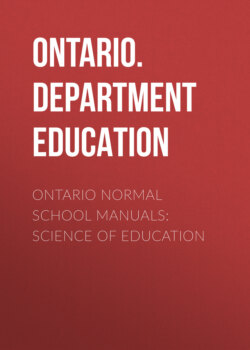Читать книгу Ontario Normal School Manuals: Science of Education - Ontario. Department of Education - Страница 25
На сайте Литреса книга снята с продажи.
PURPOSES OF CURRICULUM
ОглавлениеTable of Contents
Represents Race Experiences.—So far as education aims to have the child enter into typical valuable race experiences, this can be accomplished only by placing these experiences before him as problems in such form that he may realize them through a regular process of learning. The purpose of the school curriculum is, therefore, to provide such problems as may, under the direction of the instructor, control the conscious reactions of the child, and enable him to participate in these more valuable race experiences. In this sense arithmetic becomes a means for providing the child with a series of problems which may give him the experiences which the race has found valuable in securing commercial accuracy and precision. In like manner, constructive work provides a series of problems in which the child experiences how the race has turned the materials of nature to human service. History provides problems whose solution gives the experience which enables the pupil to meet the political and social conditions of his own time. Physics shows how the forces of nature have become instruments for the service of man. Geography shows how the world is used as a background for social life; and grammar, what principles control the use of the race language as a medium for the communication of thought.
Classifies Race Experience.—Without such control of the presentation of these racial experiences as is made possible through the school and the school curriculum, the child would be likely to meet them only as they came to him in the actual processes of social life. These processes are, however, so complex in modern society, that, in any attempt to secure experience directly, the child is likely to be overwhelmed by their complex and unorganized character. The message boy in the dye-works, for example, may have presented to him innumerable problems in number, language, physics, chemistry, etc., but owing to the confused, disorganized, and mingled character of the presentation, these are not likely to be seized upon by him as direct problems calling for adjustment. In the school curriculum, on the other hand, the different phases of this seemingly unorganized mass of experiences are abstracted and presented to the child in an organized manner, the different phases being classified as facts of number, reading, spelling, writing, geography, physics, chemistry, etc. Thus the school curriculum classifies for the child the various phases of this race experience and provides him with a comprehensive representation of his environment.
Systematizes Race Experience.—The school curriculum further presents each type of experience, or each subject, in such a systematic order that the various experiences may develop out of one another in a natural way. If the child were compelled to meet his number facts altogether in actual life, the impressions would be received without system or order, now a discount experience, next a problem in fractions, at another time one in interest or mensuration. In the school curriculum, on the other hand, the child is in each subject first presented with the simple, near, and familiar, these in turn forming basic experiences for learning the complex, the remote, and the unknown. Thus he is able in geography, for example, on the basis of his simple and known local experiences, to proceed to a realization of the whole world as the background for human life.
Clarifies Race Experience.—Finally, when a child is given problems by means of the school curriculum, the experiences come to him in a pure form. That is, the trivial, accidental, and distracting elements which are necessarily bound up with these experiences when they are met in the ordinary walks of life are eliminated, and the single type is presented. For instance, the child may every day meet accidentally examples of reflection and refraction of light. But these not being separated from the mass of accompanying impressions, his mind may never seize as distinct problems the important relations in these experiences, and may thus fail to acquire the essential principles involved. In the school curriculum, on the other hand, under the head of physics, he has the essential aspects presented to him in such an unmixed, or pure, form that he finds relatively little difficulty in grasping their significance. Thus the school curriculum renders possible an effective control of the experiencing of the child by presenting in a comprehensive form a classified, systematized, and pure representation of the more valuable features of the race experience. In other words, it provides suitable problems which may lead the child to participate more fully in the life about him. Through the subjects of the school curriculum, therefore, the child may acquire much useful knowledge which would not otherwise be met, and much which, if met in ordinary life, could not be apprehended to an equal degree.
